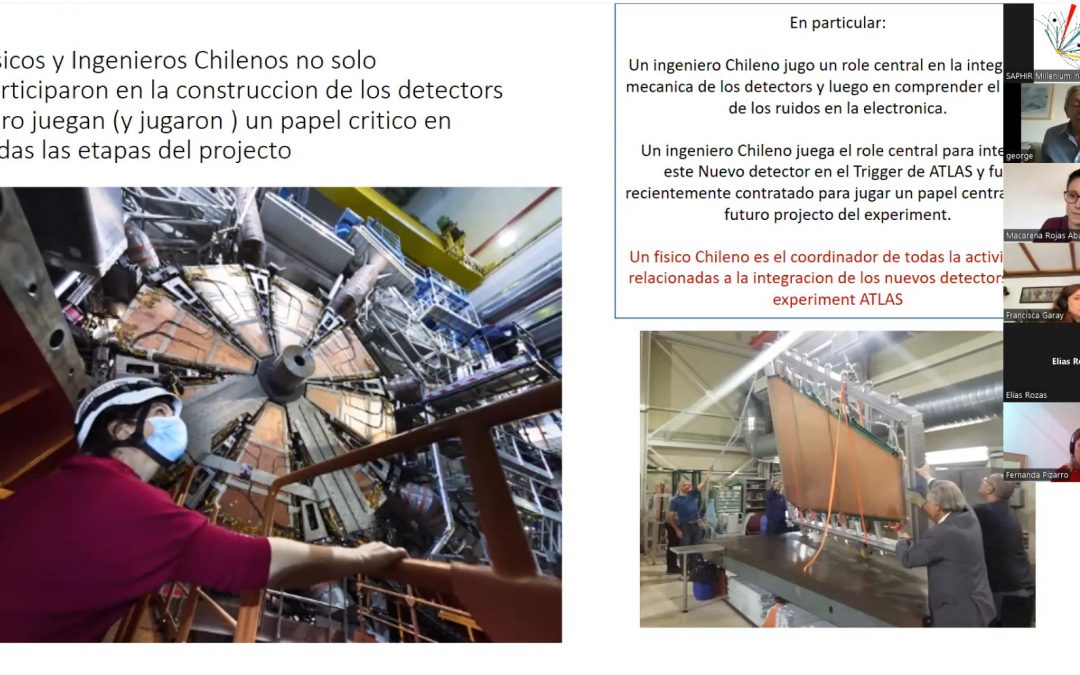The official inauguration of the Millennium Institute for Subatomic Physics at the High Energy Frontier, Saphir, took place on Monday, May 16, 2022. This important milestone for our institute was attended by authorities from our host institutions, the European Organization for Nuclear Research (CERN), the National Agency for Research and Development (ANID) and the Millennium Science Initiative, among other institutions. In addition to recounting the history of the institute, the inaugural speeches highlighted the importance of particle physics research for Chile's development.
By Jorge Román
"This center has a lot of future and we are going to invest all our effort and all our time in making it successful," said in his opening remarks the Director of our institute, Sergey Kuleshov, an academic from Universidad Andrés Bello (UNAB), on Monday, May 16, 2022.
The scientist and science communicator Macarena Rojas Ábalos was the host of this event, which was held virtually. On the occasion, the speakers highlighted the importance of the work of the Saphir Millennium Institute and how it will be crucial for Chilean development, both in the scientific and technological fields.
Ariel Orellana, Vice Rector for Research and Graduate Studies at UNAB, emphasizes that Saphir was necessary to generate a space that would allow collaboration, coordination and development of particle physics research in Chile. Orellana values how this institute has the capacity to strengthen collaboration not only with foreign organizations, but also among Chilean universities.
In our institutional video, Saphir's scientific and technical staff explains what our institute works on and why particle physics is a field of scientific, technological and educational development that can be fundamental for the future of Chile.
In our institutional video, Saphir's scientific and technical staff explains what our institute works on and why particle physics is a field of scientific, technological and educational development that can be fundamental for the future of Chile.
Pedro Bouchon, Vice Rector of Research at the Pontificia Universidad Católica, highlighted that Chile "is the only Latin American country that participates in the construction of circular [particle] accelerator parts, which endorses [...] the high standard of the national scientific work [...] and its high impact on the generation of frontier knowledge".
Camilo Erazo, Deputy Director of Centers and Associative Research of the National Agency for Research and Development (ANID), emphasizes that the centers and institutes of the Millennium Science Initiative have the freedom and facilities for the development of frontier research "without an explicit promise of achieving transferable results in a specific way, contributions from counterparts or commitment to a particular discipline". However, the most important commitment acquired by the Millennium projects is with knowledge, with creating frontier knowledge from Chile based on daring ideas and with academic teams of excellence.
In her presentation, the Alternate Director of the Saphir Millennium Institute, Francisca Garay, wanted to pay tribute to the shoulders on which particle physics research in Chile stands. It is a story that began at the Universidad Técnica Federico Santa María (USM) and was later strengthened at the Pontificia Universidad Católica de Chile (PUC). The area of theoretical physics was developed first, but already in the 2000s the area of experimental physics was formed (again at the USM) thanks to the arrival of William Brooks (USM academic and Saphir associate researcher) and our Director, Sergey Kuleshov.
Commitment to national projects
The highlight of the inauguration was a talk by the prestigious physicist George Mickenberg, who was initially trained at the PUC, worked for many years as a collaborator at CERN and who, in his own words, "dreamed of being able to take Chile to the largest particle physics project". Dr. Mickenberg explained the fundamental questions explored by particle physics and how these questions take us from the beginning of the universe to the largest and most complex machine ever built by mankind, where the conditions of the Big Bang are recreated.
In his presentation, Mickenberg also explained why this research is so important. By applying particle physics to projects that must push technology to the limit of the possible (such as the Large Hadron Collider and the Atlas experiment), there is a unique opportunity to develop and improve technologies that can even be tested in real conditions. Chile is a country that has the technological capacity, knowledge and capabilities to contribute to projects of this magnitude, which, in turn, generates opportunities for the development of the national industry.
Full video of the inauguration of the Saphir Millennium Institute.
Full video of the inauguration of the Saphir Millennium Institute.
Mickenberg stresses that, even during the social outbreak and pandemic, the Chilean team continued to work on the development of the technological components committed to CERN, because they were committed to their work and had deadlines to meet. And they did: "Chilean physicists and engineers not only participated in the construction [of the detectors for the Atlas experiment]: they play and are playing a critical role in all stages of the project". And the important thing for Mickenberg is to make sure that these people, with excellent training and a high commitment to national projects, stay in Chile, leading and contributing to high-impact projects for the country.
"It is important to create an infrastructure so that [researchers and professionals of excellence] are productive in Chile, so that people who are so highly valued elsewhere do not go abroad," says Mickenberg. According to him, "it is very important that this new center can contribute to avoid this brain, knowledge and experience drain".

